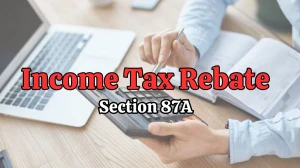
What is Property Tax and How They Are Calculated?
Property tax is a local levy on property value, calculated by mill rates and assessed value, funding essential services and projects.
Updated Sep 16, 2023
On This Page
What is Property Tax?
Property tax is a type of tax that local governments in the United States often impose to generate revenue. This tax can apply to real estate (like houses and land) or personal property (like vehicles). It's usually based on the property's value, with a specific assessment ratio and tax rate applied. Property owners are typically responsible for paying this tax, and the tax amount doesn't change with your income.
The revenue collected from property taxes is used by local governments to fund various services and projects. One advantage for the government is that property tax revenue always matches the tax levy, unlike other types of taxes. However, for property owners, the downside is that the tax amount is fixed, regardless of changes in income.
How Property Taxes are Calculated?
Property taxes are calculated by first determining the total tax rate, also known as the mill rate, for a specific region. This rate is calculated by adding together all the various tax levies that fund local services and projects. Once the mill rate is established, it is multiplied by the assessed value of a property. The assessed value includes both the land and any buildings on the property.
Tax assessors typically assess the value of a property periodically, usually every one to five years, and then charge the property owner based on the applicable tax rate set by the taxing authority. This calculation is done using the mill levy, also known as millage tax, and the assessed property value. Property owners with more valuable properties pay higher taxes since the tax amount is based on the property's value.
For example, suppose you own a property in a county where property taxes are determined by multiple entities: the city, the county, and the school district. Each entity has its own mill levy rate. The city's mill levy is 1%, the county's is 0.5%, and the school district's is 3%. To calculate the total mill levy for your property, you add these rates together: 1% + 0.5% + 3% = 4.5% or 45 mills.
Now, let's say the assessed value of your property is $500,000. To calculate your property tax, you first determine the assessed value by multiplying it by the assessment rate. If the assessment rate is 8%, then the assessed value would be $40,000 ($500,000 × 8%). Finally, you calculate the property tax by applying the total mill levy rate: $40,000 × 4.5% = $1,800. So, your property tax bill would be $1,800.
What Do Property Taxes Pay for?
Property taxes serve as a vital source of revenue for local governing bodies, supporting a wide range of essential services and community improvements. These taxes play a pivotal role in financing various critical initiatives, including water and sewer system improvements to ensure access to clean water and efficient sewage disposal.
Property tax revenues also contribute to maintaining law and order through funding for local police departments and law enforcement agencies. In cases of emergencies, such as fires, property taxes support fire departments and emergency response services, ensuring swift and effective interventions.
Education is another significant beneficiary, with property taxes funding local schools, teachers' salaries, educational resources, and the upkeep of educational facilities. Additionally, property taxes facilitate infrastructure development by financing road and highway construction and maintenance. Public libraries benefit from these taxes, offering access to books, resources, and educational opportunities for the community.
Furthermore, property taxes may support a range of other vital community services, including parks, public health programs, and community development initiatives. In essence, property taxes are instrumental in enhancing the overall quality of life within a locality by sustaining essential public services and fostering community development.
How is Property Tax Assessed?
Property tax assessment is a crucial aspect of determining the tax liability for property owners. The assessment process involves evaluating the value of the property, which directly impacts the amount of property tax owed. This assessment is subject to various methods and is conducted by tax assessors
Determining Property Value
Property tax assessment is a critical process that calculates the value of a property, impacting the amount of property tax owed. It involves various methods, with some subjective aspects. Property values can change over time, requiring periodic reassessments, and valuation dates vary by jurisdiction.
Who Determines Property Value
Property owners may declare their property's value to the taxing authority, which can accept or establish its value. Tax assessors typically make these determinations, and some states require uniform values for specific properties.
Market Value
Property values are based on fair market value, determined by willing and informed buyers and sellers without compulsion to act. Recent sales of similar properties between unrelated parties often establish market value.
Assessed Value
Many jurisdictions tax only a portion of a property's market value, known as assessed value, calculated by applying an assessment ratio. States may impose restrictions on assessment ratios and the rate at which assessed values can increase.
Equalization Among Jurisdictions
To ensure consistency, some states mandate that multiple jurisdictions taxing the same property use the same market value. Boards of equalization or similar bodies resolve disputes between jurisdictions when valuation disagreements arise.
How Do Property Taxes Work?
Property taxes are calculated based on the property tax rate multiplied by the current market value of the property. These rates are typically reassessed annually by taxing authorities. Property taxes mainly apply to real property, including land and fixed buildings.
A tax assessor, often hired by the municipality, assigns property taxes based on current market values, known as the assessed value. Payment schedules for property taxes vary by location, and property owners have the option to discuss or contest their tax rate with the assessor. Unpaid property taxes can lead to a lien on the property, which buyers should investigate before purchasing real estate.
How Much Are Property Taxes?
In the United States, homeowners typically pay a median of $2,690 per year in property taxes, based on data from the US Census Bureau. Property tax rates vary by state, ranging from 0.29% in Hawaii to 2.47% in New Jersey. New York has the highest average tax bill at $12,292, while Alabama has the lowest at $882. When you buy a home with a mortgage, a portion of your annual property taxes is usually included in your monthly mortgage payment.
For the entire US, the effective property tax rate is approximately 1.10%, calculated from 2021 data from the US Census Bureau. With a median home price of $244,900, homeowners pay around $224.17 extra each month to cover their property tax bill. If we consider the average US home value of $346,270, the average tax bill is $3,803, resulting in an additional $316.92 monthly payment toward property taxes.
What is the Difference Between Property Tax and Real Estate Tax?
The terms property tax and real estate tax are often used interchangeably, but there is a distinction between them. Real estate tax is a subset of property tax. While real estate tax specifically applies to taxes on real property, property tax can encompass both real property and tangible personal property.
In many jurisdictions, property taxes are levied on both types of property. Both real estate taxes and property taxes can be deductible on your federal income taxes, but there are limits on how much you can deduct since the Tax Cuts and Jobs Act was implemented in 2019.
Is Property Tax Constitutional?
Property taxes in the United States are subject to constitutional constraints outlined in both the United States Constitution and state constitutions. These constraints include limits on federal direct taxation, equal protection rules, and privileges and immunities provisions.
State constitutions often impose rules related to uniformity and equality in property taxation. The federal government cannot impose direct property taxes unless they are distributed to states based on their population. Additionally, residents of different states must be granted equal protections as taxpayers. These constitutional provisions ensure that property taxes are administered fairly and in accordance with legal principles
What is Property Tax - FAQs
1. What is property tax used for?
Property tax is used to fund local government services and infrastructure, such as schools, roads, and public safety.
2. How is property tax calculated?
Property tax is calculated based on the assessed value of a property multiplied by the local tax rate.
3. Can property taxes be deducted from federal income taxes?
Yes, property taxes are deductible on federal income taxes, subject to certain limitations.
4. Are property taxes the same as real estate taxes?
Property taxes include real estate taxes but may also cover tangible personal property in some jurisdictions.
5. What happens if property taxes are not paid?
If property taxes are not paid, the taxing authority may place a lien on the property or take legal action to collect the unpaid taxes, which can lead to foreclosure in some cases.




